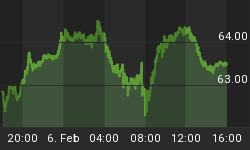Below is an excerpt from a commentary originally posted at www.speculative-investor.com on 17th September 2009.
Coming into September the markets had the potential to experience either a deflation scare or a mini blow-off in inflation-related plays. Within the first few trading days of September it became apparent that it was more likely going to be the latter.
The blow-off in inflation-related plays is taking most equities and commodities higher, with gold and silver stocks leading the way. It will probably end within the next two months, but it hasn't ended yet.
A point we would like to emphasise today is that the price surge currently underway is the natural result of the large increase in the supply of money engineered by governments and their central banks in the midst of the great deflation scare that occurred during the final four months of last year. As we have noted many times in TSI commentaries over the years, under the current monetary system it is invariably the case that rising fear of DEflation is accompanied by acceleration in the rate of monetary INflation. Some time later the effects of the money-supply growth appear in market prices, but by that time the rate of monetary inflation has generally tapered off. The result is a strange inverse correlation between the actual inflation rate (the rate of money-supply growth) and inflation expectations. Specifically, the highest rates of money-supply growth tend to go hand-in-hand with the lowest inflation expectations, and vice versa. In this respect, the most recent 12-month period has been 'par for the course' in that we had rampant monetary inflation combined with widespread fear of DEflation during September-December of last year, and now we have increasing concerns about an inflation threat following several months of relatively slow growth in the money supply.
The current relatively slow rate of money-supply growth will, of course, lead to another deflation scare, which will inevitably prompt aggressive re-inflation by the monetary authorities, and, after the usual delay, another surge in market prices.
The upshot is that when the periodic deflation scares occur -- and we can be confident that more of them will occur in the future -- there will be a tendency to give credence to deflation forecasts that are based on fallacies such as "the money-supply growth doesn't matter because it is small compared to the contraction of credit" or "the money-supply growth won't lead to higher prices because the 'velocity of money' is low" or "there won't be an inflation problem for the foreseeable future because the Fed's money injections are insignificant relative to the fall in the market value of debt". The fact is that rapid growth in the money supply ALWAYS matters; there is just a lengthy time lag between the cause (the money-supply growth) and the most obvious effect (rising prices). In this regard, it is never 'different this time'.
Keep this in mind during the next deflation scare, assuming, of course, that governments and central banks react to future perceived deflation threats as they have reacted to past threats.
We aren't offering a free trial subscription at this time, but free samples of our work (excerpts from our regular commentaries) can be viewed at: http://www.speculative-investor.com/new/freesamples.html.















